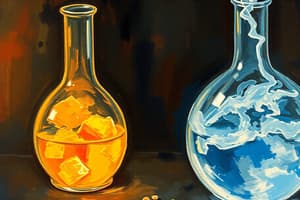Podcast
Questions and Answers
What is the basic unit of matter?
What is the basic unit of matter?
- Molecule
- Element
- Atom (correct)
- Compound
Which state of matter has a fixed volume but takes the shape of its container?
Which state of matter has a fixed volume but takes the shape of its container?
- Liquid (correct)
- Plasma
- Gas
- Solid
What type of bond involves the transfer of electrons from one atom to another?
What type of bond involves the transfer of electrons from one atom to another?
- Covalent Bond (correct)
- Hydrogen Bond (correct)
- Ionic Bond (correct)
- Metallic Bond (correct)
What term describes a substance formed from two or more elements chemically bonded together?
What term describes a substance formed from two or more elements chemically bonded together?
Which of the following describes the process of a single compound breaking down into two or more products?
Which of the following describes the process of a single compound breaking down into two or more products?
What is the unit used to measure the amount of substance in chemistry?
What is the unit used to measure the amount of substance in chemistry?
Acids are substances that donate which of the following in a solution?
Acids are substances that donate which of the following in a solution?
Which of the following best describes an exothermic reaction?
Which of the following best describes an exothermic reaction?
Flashcards are hidden until you start studying
Study Notes
Key Concepts in Chemistry
1. Basic Definitions
- Chemistry: The study of matter, its properties, composition, structure, and the changes it undergoes during reactions.
- Matter: Anything that has mass and occupies space.
2. States of Matter
- Solid: Fixed shape and volume, particles packed closely together.
- Liquid: Fixed volume but takes the shape of its container, particles are less tightly packed.
- Gas: No fixed shape or volume, particles are far apart and move freely.
3. Atomic Structure
- Atoms: Basic unit of matter, composed of protons, neutrons, and electrons.
- Protons: Positive charge, located in the nucleus.
- Neutrons: No charge, located in the nucleus.
- Electrons: Negative charge, orbit around the nucleus.
4. Elements and Compounds
- Element: A pure substance made of only one type of atom.
- Compound: A substance formed when two or more elements chemically bond together.
5. The Periodic Table
- Organized by increasing atomic number.
- Elements are grouped by similar properties (e.g., metals, nonmetals, metalloids).
6. Chemical Bonds
- Ionic Bonds: Formed through the transfer of electrons from one atom to another.
- Covalent Bonds: Formed when atoms share electrons.
- Metallic Bonds: Involves the sharing of free electrons among a lattice of metal atoms.
7. Chemical Reactions
- Reactants: Substances that undergo change.
- Products: Substances formed as a result of a chemical reaction.
- Types of reactions:
- Synthesis: Two or more reactants combine to form a product.
- Decomposition: A single compound breaks down into two or more products.
- Single Replacement: An element replaces another in a compound.
- Double Replacement: Exchange of ions between two compounds.
8. The Mole Concept
- Mole: A unit for measuring the amount of substance, equivalent to 6.022 x 10²³ particles.
- Used to relate mass and number of particles in a substance.
9. Acids and Bases
- Acids: Substances that donate protons (H⁺) in a solution.
- Bases: Substances that accept protons or donate hydroxide ions (OH⁻).
- pH Scale: Measures acidity or alkalinity of a solution (0-14 scale).
10. Stoichiometry
- The calculation of reactants and products in chemical reactions.
- Based on the conservation of mass and the mole concept.
11. Thermochemistry
- Study of heat changes during chemical reactions.
- Endothermic: Absorbs heat.
- Exothermic: Releases heat.
12. Chemical Kinetics
- Study of the speed of chemical reactions.
- Affected by temperature, concentration, surface area, and catalysts.
13. Chemical Equilibrium
- The state where the rate of the forward reaction equals the rate of the reverse reaction.
- Le Chatelier's Principle: If a dynamic equilibrium is disturbed, the system adjusts to minimize the disturbance.
These notes cover foundational concepts in chemistry and can serve as a guide for further study and review.
Basic Definitions
- Chemistry explores matter, focusing on its properties, composition, structure, and changes during reactions.
- Matter encompasses anything with mass that occupies space.
States of Matter
- Solids have a fixed shape and volume, with particles tightly packed together.
- Liquids have a fixed volume but adapt to the shape of their container, with looser particle arrangement.
- Gases possess no fixed shape or volume, featuring widely spaced particles that move freely.
Atomic Structure
- Atoms are the fundamental units of matter, made up of protons, neutrons, and electrons.
- Protons carry a positive charge and reside in the nucleus.
- Neutrons have no charge and are also found in the nucleus.
- Electrons are negatively charged and orbit the nucleus.
Elements and Compounds
- An element is a pure substance consisting of a single type of atom.
- A compound forms when two or more elements chemically bond together.
The Periodic Table
- The periodic table organizes elements by increasing atomic number.
- Elements are categorized based on shared properties, including metals, nonmetals, and metalloids.
Chemical Bonds
- Ionic bonds occur through the transfer of electrons from one atom to another.
- Covalent bonds form when atoms share electrons.
- Metallic bonds involve the sharing of delocalized electrons among metal atoms.
Chemical Reactions
- Reactants are substances that undergo change during a reaction, resulting in products.
- Types of chemical reactions include:
- Synthesis: Two or more reactants combine to create a product.
- Decomposition: A single compound breaks down into multiple products.
- Single Replacement: An element displaces another in a compound.
- Double Replacement: Ions are exchanged between two compounds.
The Mole Concept
- A mole is a measurement unit for the quantity of substance, equivalent to 6.022 x 10²³ particles.
- This concept links the mass of a substance to the number of particles it contains.
Acids and Bases
- Acids donate protons (H⁺) in solution whereas bases accept protons or donate hydroxide ions (OH⁻).
- The pH scale, ranging from 0 to 14, measures the acidity or alkalinity of a solution.
Stoichiometry
- Stoichiometry involves calculations related to reactants and products in chemical reactions, grounded in the conservation of mass and the mole concept.
Thermochemistry
- Thermochemistry examines heat changes in chemical reactions.
- Endothermic reactions absorb heat, while exothermic reactions release heat.
Chemical Kinetics
- Chemical kinetics investigates the rates of chemical reactions, influenced by temperature, concentration, surface area, and catalysts.
Chemical Equilibrium
- Chemical equilibrium occurs when the rate of the forward reaction equals that of the reverse reaction.
- According to Le Chatelier's Principle, a system at equilibrium will adjust to counteract any disturbances.
Studying That Suits You
Use AI to generate personalized quizzes and flashcards to suit your learning preferences.




